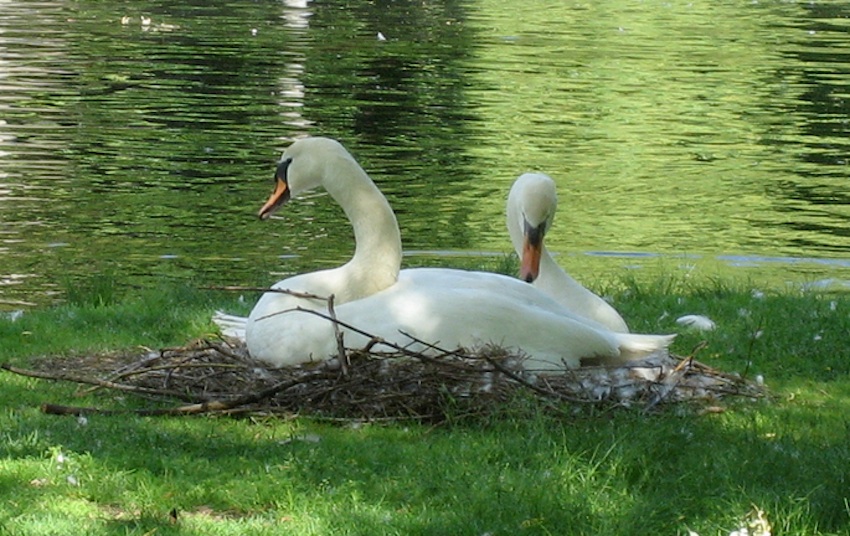The Public Garden Swans Are Nesting, But Don’t Expect Baby Swans Any Time Soon

Photo via Flickr.com
Romeo and Juliet, the swans that grace the pond in the Public Garden each summer, have been together for 10 years. And while their bond is undeniable, their legacy isn’t likely to carry on in the form of baby birds.
Despite the large eggs pedestrians strolling through the park have seen resting in a pile of interwoven twigs on the lawn in recent days, both Romeo and Juliet are female swans, so the eggs won’t hatch. “The eggs are not fertile. But yearly, [Romeo and Juliet] do lay eggs in the park. Once the eggs are laid, the two female swans do sit on them, then after several weeks they abandon the nest when they realize they won’t hatch,” says Jacquelyn Goddard, spokesperson for the Boston Parks and Recreation Department.
After some time, the city will retrieve the eggs and remove them from the nest so they don’t spoil and begin to rot.
In a statement, officials from the Franklin Park Zoo said Romeo and Juliet, whose names were carried over from their predecessors that were male and female, in order to keep the tradition alive, are the same swans that have been reintroduced to the Public Garden every year since 2003. “That’s just part of the romance about the park, so they kept the names,” Goddard said.
Each year, Mayor Tom Menino welcomes the pair to the Public Garden in May, and the birds remain in the park through October when they are brought back to the zoo and cared for until the next ceremonial swan event the following summer.
Because they are both female swans, zookeepers said the eggs won’t hatch for “obvious reasons,” but the females will still waddle across the grass and sit on the eggs based on natural instinct. In order for the eggs to be fertile, a male swan needs to be part of the mix.
In 2005, after the city figured out the swans were both female, Fred Beall, general curator of Zoo New England, noted that the birds being together wasn’t necessarily their sexual preference per se, but that their special bond was a byproduct of the fact that there were no male specimens to choose from at the time of their pairing.
“They build nests together, incubate eggs together and defend their territory together,” said Beall, in an interview with ABC news. “They’re deeply bonded.” Introducing a male at this point wouldn’t make sense, and he would likely be unwelcome since Romeo and Juliet have spent so much time together already.
If one of the swans were to pass away, however, leaving the other single in the Public Garden, zoo experts said they are likely to repair her broken bird’s heart by re-pairing with another mate. “[Swans will mate for life], so long as both survive. Any survivor will re-pair with an available mate,” according to zoo officials.
But with a lifespan of anywhere from 20 to 30 years, it isn’t likely Boston will see either mating—or egg hatching—anytime soon.

